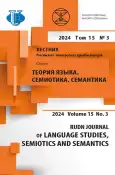Actualization of the Socially Oriented Anti-Value Concept of GREED in Humorous Discourse of the English Linguistic Culture
- Авторлар: Bochkarev A.I.1
-
Мекемелер:
- Novosibirsk State Technical University
- Шығарылым: Том 15, № 3 (2024)
- Беттер: 701-714
- Бөлім: DISCURSIVE LINGUISTICS
- URL: https://journal-vniispk.ru/2313-2299/article/view/323581
- DOI: https://doi.org/10.22363/2313-2299-2024-15-3-701-714
- EDN: https://elibrary.ru/HJMBCP
- ID: 323581
Дәйексөз келтіру
Толық мәтін
Аннотация
The peculiarities of the comic objectification of the socially oriented anti-value concept GREED are determined by applying an axiological approach consisting of five stages. The article considers the features of comic objectification of the anti-value concept of GREED. The research proves relevant as humorous characteristics of greed have been analyzed in detail. The corpus of the study comprises recordings and scripts of 500 episodes of various sitcoms and more than 70 stand-up specials by American and British writers. Disapproving exclamations accompany laughter periodically while actualizing GREED. In addition, the manifestation of greed is evaluated negatively either by the authors of the sitcoms or by its characters. In humorous discourse the concept is emphasized both manifesting the desire to be wealthy and the desire to save wealth. While the desire of being wealthy is expressed through committing immoral acts in order to achieve wealth and through thieving goods the desire to save wealth is realized either by the unwillingness to share goods with other people or by the priority of wealth over other values. The main sociocultural characteristics that are comically exposed in modern humorous discourse while specifying greed include characteristics of success (rich people), professional characteristics (politicians, bankers, etc.), ethical characteristics (Americans) and gender characteristics (women seeking to get the wealth of the men). The main language means of expressing the analyzed concept in humorous discourse are antithesis and hyperbole. In addition, GREED is mocked through actualizing such concepts as ‘intelligence’, ‘cynicism’, ‘anger’ by a comic addresser.
Авторлар туралы
Arsentiy Bochkarev
Novosibirsk State Technical University
Хат алмасуға жауапты Автор.
Email: arsentiy_87@mail.ru
ORCID iD: 0000-0003-3869-2797
SPIN-код: 2794-8198
PhD in Philology, Associate Professor, Chair at the Department of Foreign Languages of the Technical Faculties
20, K. Marx Ave., Novosibirsk, Russian Federation, 630073Әдебиет тізімі
- Karasik, V.I. (2019). Language Spiral: Values, Signs, Motives. Moscow: Gnosis. (In Russ.).
- Butakova, L.O. (2022). Words with Value Semantics in the Language Consciousness of Generation «Y» Representatives. RUDN Journal of Language Studies, Semiotics and Semantics, 13(4), 937–955. https://doi.org/10.22363/2313-2299-2022-13-4-937-955 (In Russ.).
- Semenenko, N.N. (2020). Axiology Proverbs in the Focus of the Problem of CognitiveDiscursive Modeling of the Semantics of Russian Proverbs. RUDN Journal of Language Studies, Semiotics and Semantics, 11(2), 213–232. https://doi.org/10.22363/2313-2299-202011-2-213-232 (In Russ.).
- Serebrennikova, E.F. (2011). Key Concepts of Axiological Analysis. In: Lingvistika i aksiologiya: etnosemiometriya tsennostnyh smyslov, E.F. Serebrennikova (Ed.). Moscow: TEZAURUS. pp. 27–40. (In Russ.).
- Davis, D. (2008). Communication and humor. In: The Primer of Humor Research, V. Raskin (Ed.). New York: De Gruyter Mouton. pp. 543–568.
- Mudrovskaya, A.М., Temirgazina, Z.К. & Aselderova, R.О. (2024). Ugliness as a Prototype Category: Cognitive-and-Semantic Analysis. RUDN Journal of Language Studies, Semiotics and Semantics, 15(1), 78–91. https://doi.org/10.22363/2313-2299-2024-15-1-78-91
- Raskin, V. (1985). Semantic Mechanisms of Humor. Boston: D. Reidel Publ.
- Bochkarev, A.I. (2022). Linguistic and Cognitive Characteristics of the Anti-value Concept “Negative Escapism” in Humorous Discourse. Uchenye zapiski Krymskogo gosudarstvennogo universiteta imeni V.I. Vernadskogo. Filologicheskie nauki, 8(74), 2, 98–109. (In Russ.).
- Demina, O.V. (2021). Linguistic and Stylistic Means of Satire Construction in the Animated Series. RUDN Journal of Language Studies, Semiotics and Semantics, 12(4), 1124–1146. https://doi.org/ 10.22363/2313-2299-2021-12-4-1124-1146 (In Russ.).
- Tickle, P.A. (2004). Greed: The Seven Deadly Sins. New York: Oxford University Press.
- Bochkarev, A.I. (2021). The main humorous characteristics of the anti-value concept of gluttony (based on English-language stand-up and situation comedies). Uchenye Zapiski Kazanskogo Universiteta. Seriya Gumanitarnye Nauki, 163 (4–5), 109–118. https://doi.org/10.26907/25417738.2021.4-5.109-118 (In Russ.).
- Klevtsova, V.M. (2009). Representation of the Concept of Greed in Modern English [dissertation]. Belgorod: BSU. (In Russ.).
- Bakhtin, M.M. (1990). Creativity of Francois Rabelais and folk culture of the Middle Ages and the Renaissance. Moscow: Hudozhestvennaja literatura. (In Russ.).
- Goldberg, M.H. (1994). The Complete Book of Greed: The Strange and Amazing History of Human Excess. New York: William Morrow & Co.
- Freedman, D.N. (2000). The Nine Commandments. New York: Doubleday.
- Karasik, V.I. (2002). Language Circle: Personality, Concepts, Discourse. Volgograd: Peremena. (In Russ.).
- Benton, G. (1988). The Origins of Political Joke. In: Humor in Society. Resistance and control, C. Powell, G. Paton (Eds.). London: Palgrave Macmillan. pp. 33–55.
- Meder, T. (2008). Tales of tricks and greed and big surprises: Laymen’s views of the law in Dutch oral narrative. Humor, 21(4), 435–454.
- Davies, Ch. (2008). American jokes about lawyers. Humor, 21(4), 369–386.
- Abdrazakova, E.N. (2007). Comparative-cognitive and Linguoculturological Analysis of Russian, Bulgarian and English Anecdotes [dissertation]. Tyumen: UTMN. (In Russ.).
Қосымша файлдар









